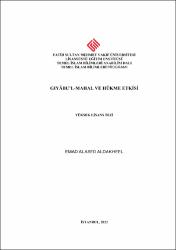Gıyâbu’l-mahal ve Hükme Etkisi
Citation
ALDAKHEEL, Emad Alabed, Gıyâbu’l-mahal ve Hükme Etkisi, Fatih Sultan Mehmet Vakıf Üniversitesi Lisansüstü Eğitim Enstitüsü Temel İslam Bilimleri Anabilim Dalı Temel İslam Bilimleri Programı,Yayımlanmamış Yüksek Lisans Tezi, İstanbul 2022.Abstract
Usûl-i fıkıh meselelerinden biri olan “Gıyâbu’l-Mahal ve Hükme Etkisi” adlı bu araştırma iki bölümde kaleme alınmıştır. İlk bölümde mahal kavramının sözlük ve terim manaları ve usûl ilmindeki yeri açıklanmıştır. Daha sonra ‘mahal’ kavramının şart, sebep, nesih ve illet gibi usûl-i fıkhın önemli terimleriyle arasındaki ilişkiye dikkat çekilmiş, bazı durumlarda aynı şeyi ifade etmeleri, bazı durumlarda ise farklılıkları ve nahiv ilmindeki “irab mahalli” mevzuu ile arasındaki benzerlik üzerinde durulmuştur. ‘Mahal’ ve ‘Gıyâbu’l-mahal’ kavramının ibadetlerle alakalı pratik örneklerin verildiği ikinci bölümde bizzat şart veya sebep manasına delalet ettiğini görülecektir. Mahal ve yokluğu hakkında çokça misal bulmak mümkündür fakat bu bölümde -zihinlerde netleşmesi maksadıyla- taharetten, namazdan, oruçtan, zekâttan ve hac konularından her bapta üç misal verilerek iktifa edilmiştir. This research, named "Mahal absence and the Effect of Judgment", which is one of the issues of Principles of Islamic jurisprudence, has been written in two parts. In the first part, the signification, meaning and place in procedural science of mahal in the lexicon and terminology are explained. Afterwards, attention was drawn to the relationship between the concept of "mahal" and the important terms of Principles of Islamic jurisprudence such as condition, reason, naskh and justification, in some cases they express the same thing, in some cases their differences and the similarity between the subjects of parsing place in the science of nahw are emphasized. It will be seen that the concepts of 'mahal' and 'Mahal absence' refer to the meaning of condition or reason in the second part, where practical examples related to worship are given. It is possible to find many examples about the mahal and its absence, but in this section -in order to clarify in the minds- it is sufficed by giving three examples in each chapter from taharah, prayer, fasting, zakat and hajj.



















